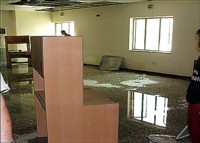Parsons Corp. under fire for Iraq work
 The Baghdad Police Academy, a Parsons-built project, has feces and urine leaking down through the ceilings, and floors rising inches off the ground and cracking apart.
The Baghdad Police Academy, a Parsons-built project, has feces and urine leaking down through the ceilings, and floors rising inches off the ground and cracking apart.LOS ANGELES - For years, Parsons Corp. has profited from a steady stream of U.S. government contracts for everything from disposing of hazardous weapons material to rebuilding hospitals, highways and other big-ticket infrastructure.
Led by a retired Army colonel, the low-profile engineering giant has remained under the radar of most public interest groups and oversight bodies to become a key player in the reconstruction of Iraq, with contracts worth about $2 billion.
But shoddy work recently prompted the U.S. Corps of Engineers to cancel its $75 million contract to renovate a critical police training academy in Baghdad. Parsons also lost deals to build a prison and dozens of medical clinics in that country after the government cited missed deadlines and cost problems.
Parsons said it has done the best work possible under the conditions in Iraq, where its reliance on subcontractors fearful of attacks has led to the delays and cost overruns.
Despite the problems, the government has little choice about funneling lucrative contracts to Parsons and a small cadre of other companies capable of taking on such large-scale projects, said Tom Schatz, president of Citizens Against Government Waste, a watchdog group.
"Regardless of how many there are or are not, the government doesn't do a good job of overseeing these projects," Schatz said.
Along with Pasadena, Calif.-based Parsons, companies that enjoy the lion's share of the big government contracts include Bechtel Corp. of San Francisco, Aliso Viejo, Calif.-based Fluor Corp., and Houston-based oil services contractor Halliburton Co.
As a private company, Parsons does not release financial figures and is not followed closely by Wall Street analysts. In addition, it's not tracked by the watchdog group Project On Government Oversight, which investigates waste and fraud.
Parsons spokeswoman Erin Kuhlman said revenue climbed from $2.5 billion in 2003 to $3 billion in 2005 and now has about 11,600 employees and carries no corporate debt, she said.
Read the rest at the San Jose Mercury News
Related Link:
Inspector General: much reconstruction work sub-standard
Related Link:
Audit: Iraq rebuilding far behind goals
Related Link:
Heralded Iraq police academy building a 'disaster'
Related Link:
Ties to GOP Trumped Know-How Among Staff Sent to Rebuild Iraq

<< Home